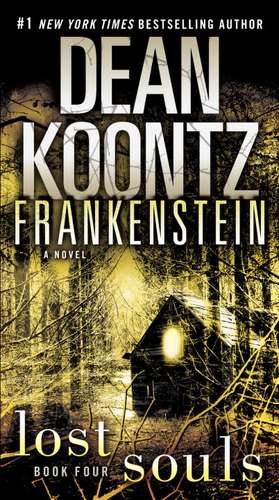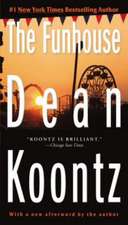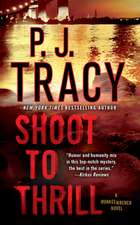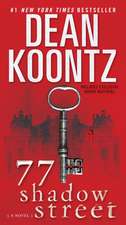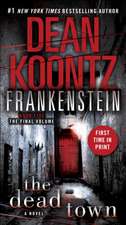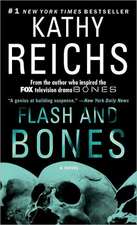Lost Souls: Frankenstein (Paperback), cartea 04
Autor Dean R. Koontzen Limba Engleză Paperback – 31 dec 2010
FRANKENSTEIN: LOST SOULS
The war against humanity has begun. In the dead hours of the night, a stranger enters the home of the mayor of Rainbow Falls, Montana. The stranger is in the vanguard of a wave of intruders who will invade other homes . . . offices . . . every local institution, assuming the identities and the lives of those they have been engineered to replace. Before the sun rises, the town will be under full assault, the opening objective in the new Victor Frankenstein’s trajectory of ultimate destruction. Deucalion—Victor’s first, haunted creation—saw his maker die in New Orleans two years earlier. Yet an unshakable intuition tells him that Victor lives—and is at work again. Within hours Deucalion will come together with his old allies, detectives Carson O’Connor and Michael Maddison, Victor’s engineered wife, Erika Five, and her companion Jocko to confront new peril. Others will gather around them. But this time Victor has a mysterious, powerful new backer, and he and his army are more formidable, their means and intentions infinitely more deadly, than ever before.
| Toate formatele și edițiile | Preț | Express |
|---|---|---|
| Paperback (2) | 58.12 lei 22-36 zile | |
| Bantam – 31 dec 2010 | 58.12 lei 22-36 zile | |
| HarperCollins Publishers – 6 ian 2011 | 82.27 lei 22-36 zile | +10.65 lei 5-11 zile |
Preț: 58.12 lei
Nou
Puncte Express: 87
Preț estimativ în valută:
11.12€ • 11.64$ • 9.20£
11.12€ • 11.64$ • 9.20£
Carte disponibilă
Livrare economică 17-31 martie
Preluare comenzi: 021 569.72.76
Specificații
ISBN-13: 9780553593679
ISBN-10: 0553593676
Pagini: 401
Dimensiuni: 108 x 191 x 25 mm
Greutate: 0.24 kg
Editura: Bantam
Seria Frankenstein (Paperback)
ISBN-10: 0553593676
Pagini: 401
Dimensiuni: 108 x 191 x 25 mm
Greutate: 0.24 kg
Editura: Bantam
Seria Frankenstein (Paperback)
Notă biografică
Dean Koontz, the author of many #1 New York Times bestsellers, lives in Southern California with his wife, Gerda, their golden retriever, Anna, and the enduring spirit of their golden, Trixie.
Extras
Chapter One
The October wind came down from the stars. With the hiss of an artist's airbrush, it seemed to blow the pale moonlight like a mist of paint across the slate roofs of the church and abbey, across the higher windows, and down the limestone walls. Where patchesof lawn were bleached by recent cold, the dead grass resembled ice in the lunar chill. At two o'clock in the morning, Deucalion walked the perimeter of the seven-acre property, following the edge of the encircling forest. He needed no lamplight to guide him; and he would have needed none even deep in the blackness of the mountain woods.
From time to time, he heard sounds of unknown origin issuing from among the towering pines, but they inspired no anxiety. He carried no weapon because he feared nothing in the forest, nothing in the night, nothing on Earth. Although he was unusually tall, muscled, and powerful, his physical strength was not the source of his confidence and fortitude.
He went downhill, past St. Bartholomew's School, where orphans with physical and developmental disabilities flew in their sleep, while Benedictine nuns watched over them. According to Sister Angela, the mother superior, the most commonly reported dreamof her young charges was of flying under their own power, high above the school, the abbey, the church, the forest.
Most of the windows were dark, although lights glowed in Sister Angela's office on the ground floor. Deucalion considered consulting her, but she didn't know the full truth of him, which she would need to know in order to understand his problem.
Centuries old but young in spirit, born not of man and woman, but instead constructed from the bodies of dead felons and animated by strange lightning, Deucalion was most at home in monasteries. As the first--and, he believed, the sole surviving--creationof Victor Frankenstein, he belonged nowhere in this world, yet he did not feel like an outsider at St. Bartholomew's Abbey. Previously, he had been comfortable as a visitor in French, Italian, Spanish, Peruvian, and Tibetan monasteries.
He'd left his quarters in the guest wing because he was plagued by a suspicion that seemed irrational but that he couldn't shake. He hoped that a walk in the cool mountain air would clear his troubled mind.
By the time Deucalion circled the property and arrived at the entrance to the abbey church, he understood that his suspicion arose not from deductive reasoning but instead from intuition. He was wise enough and sufficiently experienced to know that intuitionwas the highest form of knowledge and should never be ignored.
Without passing through the door, he stepped out of the night and into the narthex of the church.
At the entrance to the nave, he dared to dip two fingers in the font, make the sign of the cross, and invoke the Father, the Son, and the Holy Spirit. His existence was a blasphemy, a challenge to sacred order, because his maker--a mere mortal--had beenin rebellion against the divine and against all natural law. Yet Deucalion had reason to hope that he was not just a thing of meat and bone, that his ultimate fate might not be oblivion.
Without walking the length of the center aisle, he went from the threshold of the nave to the distant sanctuary railing.
The church lay mostly in shadows, brightened only by a sanctuary light focused on the crucifix towering over the altar and by votive candles flickering in crimson-glass cups.
As Deucalion appeared at the railing, he realized that another shared the church with him. Glimpsing movement from the corner of his eye, he turned to see a monk rising from the first pew.
At five feet seven and two hundred pounds, Brother Salvatore was less fat than solid, as an automobile compacted into a cube by a hydraulic press was solid. He looked as if bullets would ricochet off him.
The hard angles and blunt edges of Salvatore's face might have given him a threatening aspect in his youth, when he lived outside the law. But sixteen years in the monastery, years of remorse and contrition, softened his once-cold gray gaze with kindnessand reshaped his smile from brutish to beatific.
At the abbey, he was Deucalion's closest friend.
His large hands, holding a rosary, seemed to be all knuckles, which is what his associates had called him in his former life. Here at St. Bartholomew's, he was affectionately known as Brother Knuckles.
"Who was it they said murdered sleep?" Knuckles asked.
"Macbeth."
"I figured you'd know."
Perhaps because he was born from the dead, Deucalion lacked the daily need for sleep that was a trait of those born from the living. On the rare nights when he slept, he always dreamed.
Brother Knuckles knew the truth of Deucalion: his origin in a laboratory, his animation by lightning, his early crimes, and his quest for redemption. The monk knew, as well, that during Deucalion's sleepless nights, he usually occupied himself with books.In his two centuries, he had read and reread more volumes than were contained in all but the largest of the world's libraries.
"With me it ain't Macbeth. It's memory," said the monk. "Memory is pure caffeine."
"You've received absolution for your past."
"That don't mean the past didn't happen."
"Memories aren't rags that come clean with enough wringing."
"Guess I'll spend the rest of my life wringing them anyway. What brings you here?"
Raising one hand to trace the contours of the ruined half of his once handsome face, Deucalion murmured, "He is risen."
Looking at the crucifix, the monk said, "That ain't exactly news, my friend."
"I refer to my maker, not yours."
"Victor Frankenstein?"
That name seemed to echo across the vaulted ceiling as no other words had echoed.
"Victor Helios, as he most recently called himself. I saw him die. But he lives again. Somehow . . . he lives."
"How do you know?"
Deucalion said, "How do you know the most important thing you know?"
Glancing again at the crucifix, the monk said, "By the light of revelation."
"There is no light in my revelation. It's a dark tide in my blood--dark, cold, thick, and insistent, telling me He's alive."
Chapter Two
Erskine Potter, the future mayor of Rainbow Falls, Montana, walked slowly around the dark kitchen, navigating by the green glow of the digital clocks in the two ovens.
The clock in the upper oven read 2:14, and the clock in the lower oven displayed 2:11, as if time flowed more languidly nearer the floor than nearer the ceiling.
Being a perfectionist, Potter wanted to reset both clocks to 2:16, which was the correct time. Time must be treated with respect. Time was the lubricant that allowed the mechanism of the universe to function smoothly.
As soon as he finished his current task, he would synchronize every clock in the residence. He must ensure that the house remained in harmony with the universe.
Henceforth, he would monitor the clocks twice daily to determine if they were losing time. If the problem wasn't human error, Potter would disassemble the clocks and rebuild them.
As he circled the kitchen, he slid his hand across the cool granite countertops--and frowned when he encountered a scattering of crisp crumbs. They stuck to his palm.
He brought his palm to his nose and smelled the crumbs. Wheat flour, soybean oil, palm oil, skim-milk cheese, salt, paprika, yeast, soy lecithin.
When he licked the tasty debris from his palm, he confirmed his analysis: Cheez-It crumbs.
He liked Cheez-Its. But he didn't like crumbs being left on kitchen counters. This was unacceptable.
At the gas cooktop, he lifted one of the burner grates, set it aside, hesitated, and wiped his fingertips over the stainless-steel drip pan. Grease.
Erskine Potter believed in cleaning a cooktop after each use, not just once or twice a week. A tool or a machine, or a system, would function better and last longer if it was clean and properly maintained.
In the sink, he found dishes waiting to be washed: plates, bowls, flatware standing in drinking glasses. At least everything seemed to have been rinsed.
He hesitated to look in the refrigerator, concerned that what he found might make him angry. Anger would make him less focused and less efficient.
Focus and efficiency were important principles. Few people in the world were focused and efficient. For the good of the planet, the unfocused and inefficient needed to be killed.
As the mayor of Rainbow Falls, Montana, he would never be in a position of sufficient power to exterminate millions of people, but he would do his small part. Regardless of the scope of his authority and the size of his assignment, each member of the Community--witha capital C--was as valuable as any other.
Absolute equality was an important principle.
The embrace of cold reason and the rejection of sentimentality was another important principle.
Unfailing cooperation with others of the Community was an important principle, too, as was keeping their existence secret from ordinary men and women.
There were other important principles, as well, but none was more important than any other. When no hierarchy of values existed, making decisions became easy. Confronted with any problem, snared in any difficult situation, Erskine Potter--like any memberof the Community--just did the most efficient thing, took the most direct action, and was confident that what he had done was right.
The only morality was efficiency. The only immorality was inefficiency. Testing his self-control, risking anger, Mayor Potter opened the refrigerator. What a mess.
Jars of olives and pickles stood on the same door shelf as a squeeze-bottle of chocolate syrup. Capers, mustard, ketchup, and salsa--which logically should have been with the olives and pickles--rested instead on a shelf with a pressurized can of whippedcream and a jar of maraschino cherries, which obviously belonged with the chocolate syrup. The items on the primary shelves were stored in an unspeakably disordered fashion.
Appalled, Potter hissed between clenched teeth. Although displeased, even indignant, he would not allow himself to be angry.
Determined to proceed briskly with the task at hand, he closed the refrigerator door.
Faint footsteps crossed the room above. Potter heard someone descending the front stairs.
Beyond the kitchen, the hallway brightened. A cut-crystal fixture on the ceiling cast geometric patterns of light across the walls and floor, as if reality were fracturing.
Erskine Potter did not flee. He did not hide. He remained by the refrigerator, waiting. A silhouette appeared in the doorway. In the kitchen, from the overhead fluorescents, cool light suddenly fell through the air.
Wearing pajamas and slippers, evidently seeking a late-night snack, the current mayor of Rainbow Falls, Montana, entered the kitchen. Five feet ten, a hundred eighty pounds, fifty-two years old, with brown hair and a sweet round face, the son of Lorettaand Gavin Potter, his name was Erskine.
The current Mayor Potter halted in stunned disbelief when he saw his duplicate.
The future Mayor Potter said, "Erskine. My dear brother, I've been searching for you half my life."
This was a lie. Loretta and Gavin Potter weren't the intruder's parents. He had no mother or father. He had never been born. Instead, he was grown to maturity in mere months, programmed, and extruded.
He pretended to be the current Mayor Potter's twin only because the claim would confuse and briefly disarm his prey. As he talked, he moved, opening his arms as if to embrace his long-lost sibling. He gripped the mayor, drove a knee viciously into his crotch, and pinned him in a corner beside the double ovens with the incorrect clocks.
From under his jacket, he withdrew a pistol-like device. He pressed the muzzle to the mayor's left temple and pulled the trigger.
Instead of a bullet, the gun fired a needle that pierced the skull and penetrated the brain to a precise depth. Instantly, the mayor stopped convulsing around his crushed testicles, stopped gasping for breath. His eyes were as wide as the eyes of a child struck by wonder.
Because the needle chemically cauterized the tissue that it pierced, the victim did not bleed.
Like a nail, the needle had a head. It was not flat but rounded, resembling the head of a decorative upholstery tack. The round form looked like a silvery beetle clinging to the mayor's temple. The needle was a probe, and the head contained an abundance of electronics, intricate nanocircuitry.
The intruder led the docile mayor to the kitchen table, pulled out a chair, and said, "Sit."
When the mayor settled in the chair, hands palms-up in his lap, the intruder went to the back door and opened it. The woman and the girl entered from the porch. Nancy Potter was forty-four, attractive, with shaggy blond hair. The daughter, Ariel, was fourteen. In fact, they were replicants of the real Nancy and Ariel: grown, programmed, and extruded nine days previously.
Nancy quietly closed the back door. Ariel swept the kitchen with her gaze, then stared at the ceiling. Nancy focused on the ceiling, too, and then she and Ariel exchanged a glance.
As the replicant of Erskine Potter watched, the woman and the girl proceeded quietly out of the kitchen, into the hallway, toward the front stairs. He liked the way they moved, their swift grace and supreme efficiency. They were his kind of people.
He sat across the table from the real Erskine Potter, pointed the pistol at him, and pulled the trigger. The device contained only one round. The second shot was a telemetric command that switched on the embedded needle's electronics, initiating transmissionto a processing-and-storage module in the replicant's brain.
Although the intruder remained aware of the kitchen, through his mind raced images extracted from the mayor's gray matter, torrents of them, most of them connected and serial. Others were disconnected flashes, moments from a life.
With the images came data: names, places, experiences, scraps of dialogue, fears and hopes. He was downloading the mayor's memories with all the distortions and the discontinuities that were a part of recollections.
At the end of this session, the intruder would be able to pass for the real Erskine Potter among even the mayor's closest friends. He would recognize everyone in Potter's life and be able to draw upon rich remembrances of each person.
The ninety-minute download left him with the need to pee. He did not know why this should be the case, but it was very much the case, and he barely made it to the half bath, off the downstairs hall, without wetting himself.
When the new--and much relieved--mayor returned to the kitchen, the former mayor still sat at the table, of course, hands palms-up in his lap, looking startled, unmoving except that his lips appeared to be continuously forming words that he didn't vocalize.
The new mayor washed the dishes in the sink and put them away. He reorganized the contents of the refrigerator. He disposed of some moldy cheese and a pint of cream ten days past its expiration date.
The time was 4:08:24 a.m. His program included an awareness of time to the precise second, an internal thousand-year clock that made timepieces and calendars superfluous.
Before he could adjust the oven clocks, the new Nancy and the new Ariel returned from upstairs. Behind them shambled the real Nancy and Ariel, barefoot and in pajamas, small silver scarabs bright on their left temples.
From outside came the sound of an approaching truck, no more than a minute ahead of schedule.
From the Hardcover edition.
The October wind came down from the stars. With the hiss of an artist's airbrush, it seemed to blow the pale moonlight like a mist of paint across the slate roofs of the church and abbey, across the higher windows, and down the limestone walls. Where patchesof lawn were bleached by recent cold, the dead grass resembled ice in the lunar chill. At two o'clock in the morning, Deucalion walked the perimeter of the seven-acre property, following the edge of the encircling forest. He needed no lamplight to guide him; and he would have needed none even deep in the blackness of the mountain woods.
From time to time, he heard sounds of unknown origin issuing from among the towering pines, but they inspired no anxiety. He carried no weapon because he feared nothing in the forest, nothing in the night, nothing on Earth. Although he was unusually tall, muscled, and powerful, his physical strength was not the source of his confidence and fortitude.
He went downhill, past St. Bartholomew's School, where orphans with physical and developmental disabilities flew in their sleep, while Benedictine nuns watched over them. According to Sister Angela, the mother superior, the most commonly reported dreamof her young charges was of flying under their own power, high above the school, the abbey, the church, the forest.
Most of the windows were dark, although lights glowed in Sister Angela's office on the ground floor. Deucalion considered consulting her, but she didn't know the full truth of him, which she would need to know in order to understand his problem.
Centuries old but young in spirit, born not of man and woman, but instead constructed from the bodies of dead felons and animated by strange lightning, Deucalion was most at home in monasteries. As the first--and, he believed, the sole surviving--creationof Victor Frankenstein, he belonged nowhere in this world, yet he did not feel like an outsider at St. Bartholomew's Abbey. Previously, he had been comfortable as a visitor in French, Italian, Spanish, Peruvian, and Tibetan monasteries.
He'd left his quarters in the guest wing because he was plagued by a suspicion that seemed irrational but that he couldn't shake. He hoped that a walk in the cool mountain air would clear his troubled mind.
By the time Deucalion circled the property and arrived at the entrance to the abbey church, he understood that his suspicion arose not from deductive reasoning but instead from intuition. He was wise enough and sufficiently experienced to know that intuitionwas the highest form of knowledge and should never be ignored.
Without passing through the door, he stepped out of the night and into the narthex of the church.
At the entrance to the nave, he dared to dip two fingers in the font, make the sign of the cross, and invoke the Father, the Son, and the Holy Spirit. His existence was a blasphemy, a challenge to sacred order, because his maker--a mere mortal--had beenin rebellion against the divine and against all natural law. Yet Deucalion had reason to hope that he was not just a thing of meat and bone, that his ultimate fate might not be oblivion.
Without walking the length of the center aisle, he went from the threshold of the nave to the distant sanctuary railing.
The church lay mostly in shadows, brightened only by a sanctuary light focused on the crucifix towering over the altar and by votive candles flickering in crimson-glass cups.
As Deucalion appeared at the railing, he realized that another shared the church with him. Glimpsing movement from the corner of his eye, he turned to see a monk rising from the first pew.
At five feet seven and two hundred pounds, Brother Salvatore was less fat than solid, as an automobile compacted into a cube by a hydraulic press was solid. He looked as if bullets would ricochet off him.
The hard angles and blunt edges of Salvatore's face might have given him a threatening aspect in his youth, when he lived outside the law. But sixteen years in the monastery, years of remorse and contrition, softened his once-cold gray gaze with kindnessand reshaped his smile from brutish to beatific.
At the abbey, he was Deucalion's closest friend.
His large hands, holding a rosary, seemed to be all knuckles, which is what his associates had called him in his former life. Here at St. Bartholomew's, he was affectionately known as Brother Knuckles.
"Who was it they said murdered sleep?" Knuckles asked.
"Macbeth."
"I figured you'd know."
Perhaps because he was born from the dead, Deucalion lacked the daily need for sleep that was a trait of those born from the living. On the rare nights when he slept, he always dreamed.
Brother Knuckles knew the truth of Deucalion: his origin in a laboratory, his animation by lightning, his early crimes, and his quest for redemption. The monk knew, as well, that during Deucalion's sleepless nights, he usually occupied himself with books.In his two centuries, he had read and reread more volumes than were contained in all but the largest of the world's libraries.
"With me it ain't Macbeth. It's memory," said the monk. "Memory is pure caffeine."
"You've received absolution for your past."
"That don't mean the past didn't happen."
"Memories aren't rags that come clean with enough wringing."
"Guess I'll spend the rest of my life wringing them anyway. What brings you here?"
Raising one hand to trace the contours of the ruined half of his once handsome face, Deucalion murmured, "He is risen."
Looking at the crucifix, the monk said, "That ain't exactly news, my friend."
"I refer to my maker, not yours."
"Victor Frankenstein?"
That name seemed to echo across the vaulted ceiling as no other words had echoed.
"Victor Helios, as he most recently called himself. I saw him die. But he lives again. Somehow . . . he lives."
"How do you know?"
Deucalion said, "How do you know the most important thing you know?"
Glancing again at the crucifix, the monk said, "By the light of revelation."
"There is no light in my revelation. It's a dark tide in my blood--dark, cold, thick, and insistent, telling me He's alive."
Chapter Two
Erskine Potter, the future mayor of Rainbow Falls, Montana, walked slowly around the dark kitchen, navigating by the green glow of the digital clocks in the two ovens.
The clock in the upper oven read 2:14, and the clock in the lower oven displayed 2:11, as if time flowed more languidly nearer the floor than nearer the ceiling.
Being a perfectionist, Potter wanted to reset both clocks to 2:16, which was the correct time. Time must be treated with respect. Time was the lubricant that allowed the mechanism of the universe to function smoothly.
As soon as he finished his current task, he would synchronize every clock in the residence. He must ensure that the house remained in harmony with the universe.
Henceforth, he would monitor the clocks twice daily to determine if they were losing time. If the problem wasn't human error, Potter would disassemble the clocks and rebuild them.
As he circled the kitchen, he slid his hand across the cool granite countertops--and frowned when he encountered a scattering of crisp crumbs. They stuck to his palm.
He brought his palm to his nose and smelled the crumbs. Wheat flour, soybean oil, palm oil, skim-milk cheese, salt, paprika, yeast, soy lecithin.
When he licked the tasty debris from his palm, he confirmed his analysis: Cheez-It crumbs.
He liked Cheez-Its. But he didn't like crumbs being left on kitchen counters. This was unacceptable.
At the gas cooktop, he lifted one of the burner grates, set it aside, hesitated, and wiped his fingertips over the stainless-steel drip pan. Grease.
Erskine Potter believed in cleaning a cooktop after each use, not just once or twice a week. A tool or a machine, or a system, would function better and last longer if it was clean and properly maintained.
In the sink, he found dishes waiting to be washed: plates, bowls, flatware standing in drinking glasses. At least everything seemed to have been rinsed.
He hesitated to look in the refrigerator, concerned that what he found might make him angry. Anger would make him less focused and less efficient.
Focus and efficiency were important principles. Few people in the world were focused and efficient. For the good of the planet, the unfocused and inefficient needed to be killed.
As the mayor of Rainbow Falls, Montana, he would never be in a position of sufficient power to exterminate millions of people, but he would do his small part. Regardless of the scope of his authority and the size of his assignment, each member of the Community--witha capital C--was as valuable as any other.
Absolute equality was an important principle.
The embrace of cold reason and the rejection of sentimentality was another important principle.
Unfailing cooperation with others of the Community was an important principle, too, as was keeping their existence secret from ordinary men and women.
There were other important principles, as well, but none was more important than any other. When no hierarchy of values existed, making decisions became easy. Confronted with any problem, snared in any difficult situation, Erskine Potter--like any memberof the Community--just did the most efficient thing, took the most direct action, and was confident that what he had done was right.
The only morality was efficiency. The only immorality was inefficiency. Testing his self-control, risking anger, Mayor Potter opened the refrigerator. What a mess.
Jars of olives and pickles stood on the same door shelf as a squeeze-bottle of chocolate syrup. Capers, mustard, ketchup, and salsa--which logically should have been with the olives and pickles--rested instead on a shelf with a pressurized can of whippedcream and a jar of maraschino cherries, which obviously belonged with the chocolate syrup. The items on the primary shelves were stored in an unspeakably disordered fashion.
Appalled, Potter hissed between clenched teeth. Although displeased, even indignant, he would not allow himself to be angry.
Determined to proceed briskly with the task at hand, he closed the refrigerator door.
Faint footsteps crossed the room above. Potter heard someone descending the front stairs.
Beyond the kitchen, the hallway brightened. A cut-crystal fixture on the ceiling cast geometric patterns of light across the walls and floor, as if reality were fracturing.
Erskine Potter did not flee. He did not hide. He remained by the refrigerator, waiting. A silhouette appeared in the doorway. In the kitchen, from the overhead fluorescents, cool light suddenly fell through the air.
Wearing pajamas and slippers, evidently seeking a late-night snack, the current mayor of Rainbow Falls, Montana, entered the kitchen. Five feet ten, a hundred eighty pounds, fifty-two years old, with brown hair and a sweet round face, the son of Lorettaand Gavin Potter, his name was Erskine.
The current Mayor Potter halted in stunned disbelief when he saw his duplicate.
The future Mayor Potter said, "Erskine. My dear brother, I've been searching for you half my life."
This was a lie. Loretta and Gavin Potter weren't the intruder's parents. He had no mother or father. He had never been born. Instead, he was grown to maturity in mere months, programmed, and extruded.
He pretended to be the current Mayor Potter's twin only because the claim would confuse and briefly disarm his prey. As he talked, he moved, opening his arms as if to embrace his long-lost sibling. He gripped the mayor, drove a knee viciously into his crotch, and pinned him in a corner beside the double ovens with the incorrect clocks.
From under his jacket, he withdrew a pistol-like device. He pressed the muzzle to the mayor's left temple and pulled the trigger.
Instead of a bullet, the gun fired a needle that pierced the skull and penetrated the brain to a precise depth. Instantly, the mayor stopped convulsing around his crushed testicles, stopped gasping for breath. His eyes were as wide as the eyes of a child struck by wonder.
Because the needle chemically cauterized the tissue that it pierced, the victim did not bleed.
Like a nail, the needle had a head. It was not flat but rounded, resembling the head of a decorative upholstery tack. The round form looked like a silvery beetle clinging to the mayor's temple. The needle was a probe, and the head contained an abundance of electronics, intricate nanocircuitry.
The intruder led the docile mayor to the kitchen table, pulled out a chair, and said, "Sit."
When the mayor settled in the chair, hands palms-up in his lap, the intruder went to the back door and opened it. The woman and the girl entered from the porch. Nancy Potter was forty-four, attractive, with shaggy blond hair. The daughter, Ariel, was fourteen. In fact, they were replicants of the real Nancy and Ariel: grown, programmed, and extruded nine days previously.
Nancy quietly closed the back door. Ariel swept the kitchen with her gaze, then stared at the ceiling. Nancy focused on the ceiling, too, and then she and Ariel exchanged a glance.
As the replicant of Erskine Potter watched, the woman and the girl proceeded quietly out of the kitchen, into the hallway, toward the front stairs. He liked the way they moved, their swift grace and supreme efficiency. They were his kind of people.
He sat across the table from the real Erskine Potter, pointed the pistol at him, and pulled the trigger. The device contained only one round. The second shot was a telemetric command that switched on the embedded needle's electronics, initiating transmissionto a processing-and-storage module in the replicant's brain.
Although the intruder remained aware of the kitchen, through his mind raced images extracted from the mayor's gray matter, torrents of them, most of them connected and serial. Others were disconnected flashes, moments from a life.
With the images came data: names, places, experiences, scraps of dialogue, fears and hopes. He was downloading the mayor's memories with all the distortions and the discontinuities that were a part of recollections.
At the end of this session, the intruder would be able to pass for the real Erskine Potter among even the mayor's closest friends. He would recognize everyone in Potter's life and be able to draw upon rich remembrances of each person.
The ninety-minute download left him with the need to pee. He did not know why this should be the case, but it was very much the case, and he barely made it to the half bath, off the downstairs hall, without wetting himself.
When the new--and much relieved--mayor returned to the kitchen, the former mayor still sat at the table, of course, hands palms-up in his lap, looking startled, unmoving except that his lips appeared to be continuously forming words that he didn't vocalize.
The new mayor washed the dishes in the sink and put them away. He reorganized the contents of the refrigerator. He disposed of some moldy cheese and a pint of cream ten days past its expiration date.
The time was 4:08:24 a.m. His program included an awareness of time to the precise second, an internal thousand-year clock that made timepieces and calendars superfluous.
Before he could adjust the oven clocks, the new Nancy and the new Ariel returned from upstairs. Behind them shambled the real Nancy and Ariel, barefoot and in pajamas, small silver scarabs bright on their left temples.
From outside came the sound of an approaching truck, no more than a minute ahead of schedule.
From the Hardcover edition.
Recenzii
“Koontz does his dance of . . . suspense, wry dialogue, sharp characterization . . . charming (and well-integrated) comic relief, and cultural criticism more adroitly than almost ever before.”—Booklist (starred review)
Descriere
Koontz raises the stakes--and the suspense--taking his Frankenstein saga to a dynamic new level with the riveting story of a small town under siege, where good and evil, destruction and creation, converge as the fate of the world hangs in the balance. Available in a tall Premium Edition.
